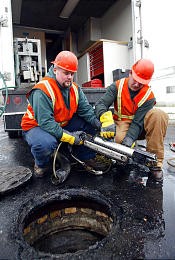Deseret News, Tuesday, January 08, 2002
Salt Lake sewer workers just go with the flow
By Anne Jacobs
Deseret News staff writer
Jared Ballard's job wouldn't be so bad if it weren't for the commute.
Yours, that is. Ballard
and the other men who climb down manholes throughout Salt Lake City
don't flinch at the filth, and sometimes valuable stuff, washing through the sewers they maintain. It's what's above ground that concerns them --the drive-by shoutings and the dangerous traffic speeding by.
|
It's a habit you develop when you work around splattering raw sewage.
Wastewater workers benefit everyone, but to most people, they're invisible. Sometimes dangerously so. One driver plowed through the barricade and orange traffic cones because she didn't see them. She didn't stop until her car got stuck on the sewer equipment set up around the manhole. Fortunately, the men were up the road, remotely operating a camera they use to look for pipe problems.
In Salt Lake City, 13 men maintain more than 600 miles of underground pipe. Every day we drive over these pipes, most about the diameter of small and large pizzas, that whisk our unspeakables safely away.
It's more than a convenience -- it's a health issue. Imagine a city of 181,000 using outhouses. That would do ugly things to your quality of life, not to mention your groundwater. And no one seems to notice the crew's efforts except the bright people who stop to bawl out a worker or throw ketchup at a maintenance truck.
Sewer maintenance is labor-intensive, unappreciated, never-ending work. The workers stay busy all year -- cleaning lines, investigating complaints, repairing manhole covers and sealing them down, jackhammering out the manholes when the city paves over them, mixing and pouring cement, digging out and replacing pipe, keeping an eye out for curious kids who get too close and keeping a patient ear open for the know-it-all resident who has suggestions for repairing pipes. But the workers like their job.
Fullmer said he likes being outside and cleaning the lines, which get blocked by invading tree roots, sticks poked through manhole covers, and the natural gathering of what the industry calls grit. He and Ballard said they both appreciate the teamwork and cooperation.
"We're all out here to keep the city sewer going," Ballard said. "It's good to know that you've got someone watching your back all the time."
The crew's camaraderie is apparent in the way the workers kid each other and chuck a snowball or two after work.
"It's a good job," Ballard said. "Smells bad, but that's about it."
And sometimes it doesn't smell so bad. "Every once in a while someone'll be washing dishes or clothes, and you can smell their laundry soap," Ballard said. "That's a welcome blessing."
Contrary to common perception, sewer lines carry more than just human waste. "It's everything that comes out of your house," Fullmer said. "So it's basically 80 percent water. They do have traces of waste, but it's not as gross as you think."
Sometimes they find hidden treasures -- diamonds in the roughage.
"You'd be amazed what you can find in the sewer lines," Fullmer said. Jewelry, utility knives, screwdrivers, drill bits, rebar, two-by-fours, marbles, Hot Wheels, plastic dinosaurs, false teeth, a bowling ball, and change.
"That's another reason why you don't want your kids to ever put coins in their mouth," worker Mike Bartholio said.
The sewer also has hypodermic needles, broken glass and razor blades, so the workers have to be careful. The city provides tetanus and hepatitis shots for those who want them.
The city also supplies soap and hand sterilizers, and the men take full advantage of them.
"We have the cleanest hands in the city," said Ballard, who uses Lava soap.
"At times," said Fullmer, who prefers Fast Orange. "Sometimes they're the dirtiest."
The worst part of the job, the men say, is grease. The hot grease people pour down the drain turns spongy solid and sticky when it hits the cold sewer pipes. Even household grease can cause a sewer heart attack, coating the pipe and plugging it. But the flow can't be turned off -- it's gravity-powered. So all the stuff people sent down the drain starts to come back in the way it left.
Then the sewer crew has to divert traffic around a manhole and clean out the pipe. And grease that's been soaking up sewage is no fun to deal with.
"It's really nasty," Fullmer said.
The crew also cleans up after contractors who mistakenly drill through sewer pipes while trying to lay fiber-optic cables for Internet and cable TV service.
"We'll clean it up and ask questions later," said Rick Bright, wastewater and stormwater manager. "Our number one thing is to make sure no other customers are affected." Companies foot the bill for repairs, however.
Given all that sewer workers do for the city, they deserve some respect. So if you must make a scene when you see them in traffic, maybe you should just shake their hands.
They're the cleanest in the city.
E-mail: ajacobs@desnews.com
© 2002 Deseret News Publishing Company
